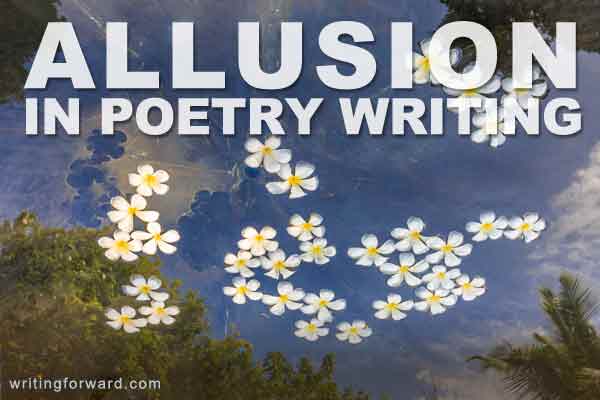As we read poetry and other forms of literature, we’ll inevitably come across allusions. An allusion is a reference to something else; it can be indirect or explicit.
In poetry, most allusions refer to other works of art and literature or to historical persons or events. Cultural references are also common. Although allusion is a literary device, it’s often used in casual conversation and other forms of communication, expression, and the arts.
A quick reference can encapsulate a broad idea; therefore, an allusion allows us to make a deep and meaningful statement with just a few words. This is especially useful in poetry, because poets often want to be economical in their use of language to communicate big ideas. However, allusion requires an understanding between the poet and the reader — a common and shared knowledge about the reference that is being made.
Understanding Allusion in Poetry
Often we’ll find ourselves ignorant about a reference that we encounter in a work of literarture. Fortunately, we can look up these references to better understand the authors’ intent.
Maya Angelou’s poem, “The Detached,” includes an allusion to Bluebeard.
We die,
Welcoming Bluebeards to our darkening closets,
Stranglers to our outstretched necks,
Stranglers, who neither care nor
care to know that
DEATH IS INTERNAL.
Without a basic understanding of Bluebeard, “The Detached” loses its full meaning. Who or what is a Bluebeard?
A quick trip to Wikipedia tells us that Bluebeard is a French folktale: “The tale tells the story of a wealthy violent man in the habit of murdering his wives and the attempts of one wife to avoid the fate of her predecessors.”
Now Bluebeard makes sense in the context of “The Detached.” But a quick lookup may only give us partial insight.
This summary of Bluebird doesn’t convey the details of the folktale. Nor does it reveal the ending, which might be significant to understanding its placement in Maya Angelou’s poem. The story of Bluebeard is rich with motifs about secrets, temptation, control, disobedience, and deliverance. Bluebeard’s latest wife is warned to avoid one of the closets in their residence, but the temptation is too great, and she finds the slain bodies of his previous wives in the bloody chamber. Bluebeard comes home and discovers his wife’s betrayal and prepares to kill her. The wife’s fate seems sealed, but her brothers come to the rescue and kill Bluebird before he can murder her. She survives, the heir to Bluebeard’s riches.
Is Bluebeard meaningful in Angelou’s poem only to the extent that he was a murderous domestic abuser, or is the ending of the tale, in which Bluebeard is executed, relevant? Does it matter that it fell to the woman’s brothers to kill Bluebird? And we must consider the time and place in which a piece of literature was composed. What was society like in Bluebeard’s time? What were the dynamics of marriage and gender?
A full reading of Bluebeard gives us better insight to “The Detached,” but researching such allusions in poetry can also lead to more questions.
Know Your Audience
Using allusion in poetry comes with some risk. Some readers won’t pause to look up allusions they’re not already familiar with. In fact, some may not recognize an allusion at all. Biblical allusions are common in poetry but are meaningless to anyone who aren’t familiar with biblical texts. Allusions to famous works of literature are also common, but again, they are dependent on the reader’s familiarity with the referenced material.
When using allusion in poetry, always consider whether your audience will understand the reference you’re making. Will they be able to identify the allusion? Will they be familiar with the reference? Will they be willing to look it up? And will their understanding be vague or lucid? Could the allusion be misinterpreted? Will it clarify the poem or lead to more questions, and would more questions be welcome? And if the allusion is unfamiliar to readers, can they make sense of the poem anyway?
Allusion Beyond Poetry
Allusion is a literary device and isn’t relegated exclusively to the realm of poetry. In fact, allusion is common in our culture and can be easily witnessed in the many memes floating around the internet. For example, we can joke in the middle of July that “winter is coming.” Only Game of Thrones fans will understand the allusion.
Do you have any additional thoughts or questions about allusion in poetry? Leave a comment, and keep writing!





Will we see poetic allusions to television programs eventually? I sure hope not.
I’m sure they’re already out there. Television is part of our culture, so of course it will show up in poetry.